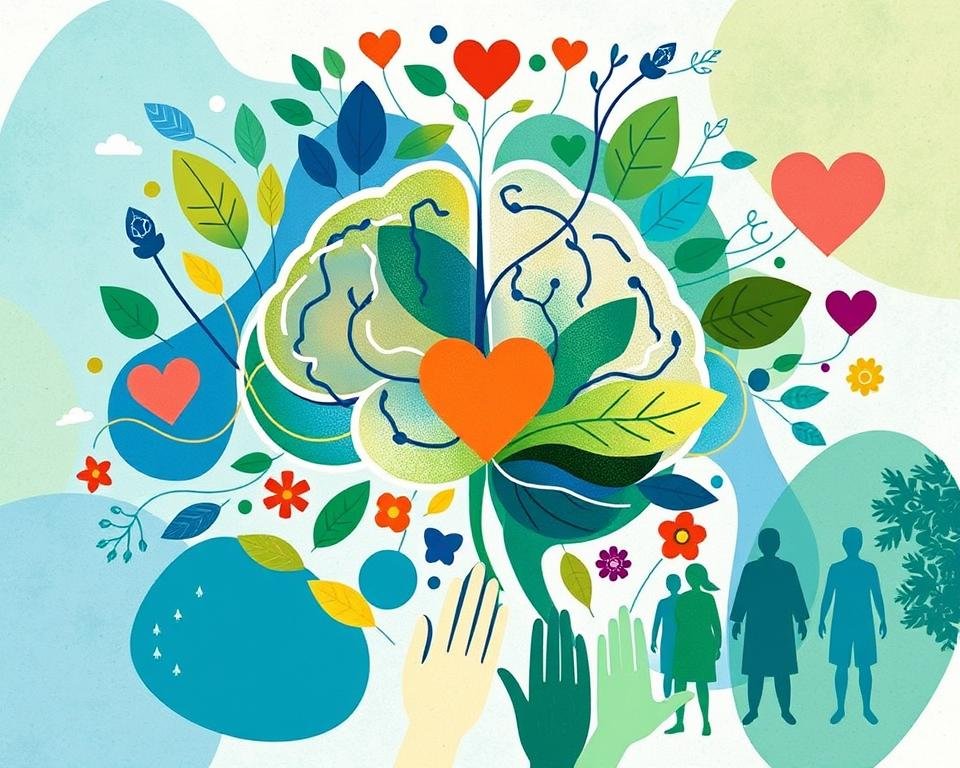Mental health is key to our overall well-being. It affects how we think, feel, and act every day. Knowing the basics of mental health is essential for a balanced life.
This article aims to enlighten you on mental health. It will give you insights into well-being and why awareness is important.
Did you know that nearly one-in-five adults in the U.S. face mental health issues each year? This includes depression, anxiety, and bipolar disorder. Getting help from mental health professionals is vital for a better life and happiness.
Suicide prevention is a global priority. Banning harmful pesticides can help reduce suicide rates. School programs also help by teaching mental health awareness early on.
The World Health Organization (WHO) says we need better mental health care. We should focus on community-based services. This makes care more accessible, affordable, and of high quality.
Understanding mental health is more than just knowing about its disorders. It’s about how it shapes our experiences and interactions. Taking care of our mental health is important for resilience and community contribution.
Introduction to Mental Health
Mental health covers our emotional, psychological, and social well-being. It affects how we think, feel, and act. Understanding mental health is key because it impacts our lives in many ways.
Good mental health helps us handle stress better, build stronger relationships, and make smarter choices. It’s about enjoying life and bouncing back from tough times.
Many people struggle with mental health issues at some point. In the U.S., nearly one in four adults (58.7 million) deal with a mental health condition. This shows why we need to tackle these problems to support mental wellness.
Also, 1 in 7 children (8 million) between 3 to 17 have a diagnosed mental or behavioral health issue. This highlights that mental health problems can start early and affect people of all ages.

Good mental health is more than just not having a disorder. It’s about enjoying life and being strong when faced with challenges. Almost one in five (19 percent) of U.S. adults face some form of mental illness each year. This shows how common these issues are and why we need better support and understanding.
Mental illness can cause many problems, like feeling less happy, family issues, and social isolation. It can also weaken our immune system, making us more likely to get sick. So, taking care of our mental health is essential for our overall well-being.
“Mental health is not a destination, but a process. It’s about how you drive, not where you’re going.” – Noam Shpancer, PhD
| Statistics | Details |
|---|---|
| Adults with Mental Health Conditions | Nearly one in four U.S. adults (58.7 million people) |
| Serious Mental Health Conditions | Nearly one in 20 U.S. adults (14.6 million people) |
| Children with Mental/Behavioral Health Conditions | 1 in 7 (8 million children) |
| General Prevalence | Nearly 1 in 5 (19 percent) of U.S. adults annually |
| Substance Use Disorder | 1 in 12 (8.5 percent) of adults |
| Serious Mental Illness | 1 in 24 (4 percent) of adults |
| Suicide Rates | Second leading cause of death for Americans aged 15-34 |
| Types of Mental Illnesses | More than 200 types |
Mental Health Conditions
Mental health conditions include many disorders that affect thoughts, emotions, and behaviors. These range from common issues like anxiety and depression to more severe Serious Mental Illnesses (SMIs). It’s important to understand these to help early and effectively.
Common Mental Health Disorders
Many people face common mental health disorders daily. Anxiety and depression are among the most common, affecting 1 in 5 U.S. adults each year. Anxiety can cause too much worry, fear, or stress. Depression leads to persistent sadness and loss of interest.
Serious Mental Illnesses (SMIs)
SMIs are more severe mental health issues. They include bipolar disorder, major depression, and schizophrenia. These affect 1 in 20 U.S. adults, impacting daily life and relationships.
| Condition | Prevalence | Impact |
|---|---|---|
| Anxiety | 1 in 5 adults annually | Daily life disruptions, excessive worry |
| Depression | 1 in 5 adults annually | Persistent sadness, loss of interest |
| Bipolar Disorder | Less common | Severe mood swings, functional impairments |
| Schizophrenia | Less common | Disordered thinking, significant life challenges |
Early recognition and treatment of mental health disorders are key. It’s vital to seek professional help. Mental health conditions can affect anyone. For more information, visit this resource.
The Importance of Mental Health
Understanding the importance of mental health is key. It affects our personal lives, school, and work. It also shapes how we handle stress and interact with others.
By focusing on mental health, we can live a more balanced and fulfilling life.

Affects on Daily Life
Mental health greatly influences our daily lives. Bad mental health can make it hard to focus and make decisions. It can also hurt our relationships and work performance.
For example, depression and anxiety can disrupt sleep. This affects our energy and daily tasks. Spotting early signs like changes in eating or drinking habits is vital.
Impact on Physical Health
Mental and physical health are closely linked. Poor mental health can cause physical problems like heart disease and weakened immune systems. The American Heart Association says depression can worsen heart conditions.
Bad habits like smoking and poor diet can make mental health issues worse. But, staying mentally healthy through exercise and good sleep can boost physical health.
Stress management, professional help, and support groups are key. They help with both mental and physical health.
Mental health issues can run in families, showing a genetic link. Environmental factors like disasters and bad social settings can also harm mental health. Creating a positive environment and healthy habits can help protect against these issues.
Factors Influencing Mental Health
Mental health is complex and influenced by many factors. These include biological, social, and psychological elements. Knowing these factors helps us manage mental health better.
Biological Factors
Biological factors play a big role in mental health. Genetics, brain chemistry, physical health, and lifestyle are key. For example, genetics can make some people more likely to have mental health issues. Diet, sleep, and physical health also affect our mental state.
- Genetics: Genes can make us more likely to have mental illnesses.
- Brain Chemistry: Imbalances in brain chemicals can change our mood and behavior.
- Physical Health Conditions: Illnesses or hormonal changes can impact our mental health.
Social and Economic Factors
Social factors greatly affect our mental health. Things like relationships, family, culture, and money matter a lot. Studies show that money issues, job loss, and poor living conditions can harm our mental health. But, having good relationships and community support can help.
- Socioeconomic Status: Being poor or in debt can lead to mental health problems.
- Family Dynamics: Seeing how family handles stress can shape our own stress responses.
- Community Support: Having a strong support network can improve our mental health.
Psychological Factors
Psychological factors are also very important. They include how we cope, our personality, and past experiences. Childhood trauma or neglect can affect our mental health for years. Learning to manage stress and emotions is key to good mental health. Practicing self-care and developing healthy coping skills early can help prevent mental health issues.
- Trauma: Severe trauma or abuse can lead to mental health problems.
- Coping Skills: Being able to handle stress and emotions is essential for mental stability.
- Personality Traits: Traits like resilience and optimism can help our mental health.
Understanding the many factors that influence mental health is vital. It helps us develop more effective treatments. For more information on urgent mental health care, check out this useful resource.
What is Mental Health
Defining mental health means understanding it as a state of well-being. It’s when people know their strengths, handle everyday stress, and help their communities. This shows how vital mental health is for a balanced life.
Mental health shapes how we think, feel, and act. The National Institute of Mental Health says many Americans will face a mental disorder. These issues can make daily life tough and even harm our physical health.
- Biological factors like genes and brain chemistry
- Life experiences like trauma or abuse
- Family history of mental health issues
- Lifestyle choices including diet and physical activity
Many things can affect our mental health. But, how we view and handle mental health is changing.
Practices like relaxation, meditation, and being thankful can boost mental health. Spotting early signs, like changes in eating or mood, is key to acting fast.
When we need help, we often turn to mental health experts. They help with depression, stress, trauma, and more. Talk therapy and medicine are also good ways to get better.
Learning to cope and taking care of ourselves can help us face mental health challenges. Remember, it’s okay to feel overwhelmed. Asking for help is a big step towards better mental health.
Early Warning Signs of Mental Health Issues
It’s key to spot early signs of mental health problems. Catching them early can make a big difference. It can lessen the illness’s impact and keep daily life on track.
Studies show that half of mental health issues start by age 14, and 3/4 by age 24. This shows why we must watch for signs in both kids and adults.
Behavioral Signs
Behavioral changes are often the first signs of mental health issues. These signs might include:
- Withdrawal from social interactions
- Changes in eating and sleeping patterns
- Decreased energy levels
- Frequent disobedience or changes in school performance in young children
- Avoiding friends and family
- Substance abuse to manage mental health symptoms
| Behavioral Signs | Description |
|---|---|
| Social Withdrawal | Avoiding interactions with family and friends, isolating oneself |
| Sleep Pattern Changes | Insomnia, excessive sleeping, or inconsistent sleep routines |
| Energy Levels | Feeling excessively tired, low energy, or lethargic |
Emotional Signs
Emotional changes are also important signs. They might show up as:
- Feelings of hopelessness or sadness
- Extreme mood changes, including uncontrollable “highs” or feelings of euphoria
- Prolonged or strong feelings of irritability or anger
- Excessive worrying or fear
- Feelings of low self-worth or guilt
Watching for these signs and urging people to see a mental health expert is important. It helps get help early. Spotting and dealing with these signs can lead to better care and support.
Common Mental Health Disorders
An overview of mental health disorders shows that common issues like anxiety, depression, and mood swings really affect our daily lives. These problems can change how we feel, think, and act. Let’s dive into some of the most common mental health issues affecting people worldwide.
Depression: It affects about 280 million people, including 23 million kids and teens. It can mess with their feelings and health. Signs include feeling down, being irritable, and not wanting to be around people.
Depression often goes hand in hand with generalized anxiety disorder (GAD), making it hard to figure out what’s going on.
Generalized Anxiety Disorder (GAD): It impacts 301 million people, with 58 million being young. GAD is all about feeling too anxious and worried for at least 6 months. It often mixes with depression, making it tough to diagnose.
Panic Disorder: People with this disorder have sudden panic attacks or worry about certain situations. This can lead to agoraphobia, where they fear being in places they can’t easily leave.
Obsessive-Compulsive Disorder (OCD): OCD is all about having unwanted thoughts and doing the same things over and over. People might worry too much about germs or need everything to be perfectly organized.
Post-Traumatic Stress Disorder (PTSD): About 7-8% of people will get PTSD at some point. It starts after a big event, and women are more likely to get it than men. It’s marked by intense fear and memories of the traumatic event.
Looking at mental health disorders, we also see bipolar disorder, schizophrenia, eating disorders, and neurodevelopmental disorders. Schizophrenia affects 24 million people, and eating disorders impact 14 million globally. These issues need to be recognized, assessed, and treated properly.
| Disorder | Global Statistics (2019) | Age Group Affected | Key Characteristics |
|---|---|---|---|
| Depression | 280 million | All ages, including 23 million children and adolescents | Low mood, irritability, social withdrawal, fatigue, suicidal ideation |
| Generalized Anxiety Disorder (GAD) | 301 million | All ages, including 58 million children and adolescents | Excessive anxiety and worry, coexisting with depression |
| Panic Disorder | – | All ages | Spontaneous panic attacks, potentially agoraphobia |
| Obsessive-Compulsive Disorder (OCD) | – | All ages | Obsessions and compulsions, repetitive behaviors |
| Post-Traumatic Stress Disorder (PTSD) | – | All ages | Anxiety, intrusive traumatic memories, higher rates in women |
| Bipolar Disorder | 40 million | All ages | Mood fluctuations, episodes of mania and depression |
| Schizophrenia | 24 million | All ages | Delusions, hallucinations, disordered thinking |
| Eating Disorders | 14 million | All ages | Anorexia nervosa, bulimia nervosa, disordered eating patterns |
| Neurodevelopmental Disorders | – | Primarily children and adolescents | Autism spectrum disorder, attention deficit hyperactivity disorder |
This overview of mental health disorders shows how important it is to tackle these issues. We need better mental health services, more awareness, and early help.
Diagnosing Mental Health Conditions
Finding out if you have a mental health issue can take many steps. It involves both professional checks and knowing yourself well. Getting a correct diagnosis is key for good treatment.
Role of Healthcare Professionals
Healthcare experts are vital in spotting mental health problems. They use the DSM-5, a detailed guide for diagnosing mental health issues. This guide was updated in 2022 and helps identify many mental health conditions.
Doctors and therapists help patients understand their mental health. They know how to spot symptoms and suggest the right treatments. Getting a diagnosis quickly is important, as many people in the U.S. face mental health issues each year.
Self-assessment and Awareness
Knowing yourself is just as important as getting a doctor’s help. People who are aware of their feelings can spot problems early. This can help stop issues from getting worse.
Online tools can help you check your mental health. But, always remember that a doctor’s opinion is the most important. Being aware of your mental health can help you find patterns or triggers. This can lead to better mental health checks and a happier life.
Treatment Options for Mental Health Disorders
Treating mental health disorders requires a personalized approach. The main treatments include psychotherapy, medications, and alternative methods. Each helps improve mental health and quality of life.
Psychotherapy
Psychotherapy, or “talk therapy,” is key in treating mental health issues. It involves talking with a therapist about thoughts, feelings, and actions. Techniques like CBT and DBT help manage symptoms and find coping strategies.
Research shows psychotherapy is effective for anxiety, depression, and PTSD.
Medications
Medications help balance brain chemicals linked to mental health disorders. Types include antidepressants, antipsychotics, and mood stabilizers. Each type works differently to reduce symptoms and improve daily life.
It’s important to understand the benefits and risks of medications. Working with a healthcare professional ensures the right medication and dosage are chosen.
Alternative Treatments
Alternative treatments add to traditional methods. They include mindfulness, meditation, art therapy, and exercise. Brain stimulation therapies like ECT and TMS are options when other treatments don’t work.
EMDR is also helpful for PTSD. These treatments can make mental health treatment plans more effective.
| Treatment Type | Examples | Conditions Treated |
|---|---|---|
| Psychotherapy | CBT, DBT, EMDR | Anxiety, Depression, PTSD |
| Medications | Antidepressants, Antipsychotics | Bipolar Disorder, Schizophrenia |
| Alternative Treatments | Mindfulness, ECT, TMS | Chronic Depression, PTSD |
Mental Health Promotion and Prevention
Mental health promotion and prevention are key to keeping our minds healthy. By focusing on mental health, we can encourage good habits and prevent mental disorders. These efforts help tackle the root causes of mental health problems, creating a supportive community.
Early childhood programs, support for vulnerable groups, and mental health education in schools are important. These initiatives help build a strong foundation for mental wellbeing. Community development programs also play a big role in creating a healthy environment for mental health.
Studies show that positive youth development works well. It engages young people in positive activities, using their strengths. Programs for different age groups are essential in preventing mental health issues. The Global Burden of Disease report (2019) highlights the need for these strategies.
Wraparound care for children and teens has shown great results. It’s also important to address mental health in low-and-middle-income countries, despite the lack of resources.
Preventive mental health efforts aim to reduce risks and promote wellbeing. These efforts vary and are tailored to different ages. For example, some programs are for everyone, while others are for those at higher risk.
New approaches in mental health promotion are showing promise. Digital interventions, adventure therapy, and community pharmacy programs have shown positive results. Mental health promotion targets various groups and settings, including schools and online platforms.
- Early childhood interventions and support for children
- Mental health activities in schools and violence prevention
- Programs for vulnerable groups
- Community development programs
- Positive youth development and wraparound care coordination
The table below provides a comparative look at mental health expenditure across regions:
| Region | Expenditure (% of GDP) |
|---|---|
| Developed Regions | 3-4% |
| Low-and-Middle-Income Countries |
There are many interventions for mental health promotion and prevention. Ongoing efforts are essential. Promoting mental health helps prevent issues and improves society as a whole.
Lifestyle Tips for Mental Wellness
Changing your lifestyle can greatly improve your mental health. Small daily changes can lead to better mental wellness and a higher quality of life. Here are some effective tips to help you:
Good Sleep Hygiene
Good sleep hygiene is key for mental health. Aim for 7-9 hours of sleep each night. Stick to a sleep schedule and avoid caffeine before bedtime.
Make your sleep area comfy. The best sleep temperature is between 60 and 67 degrees Fahrenheit. It’s also important to treat sleep disorders like insomnia or sleep apnea.
Physical Activity
Regular exercise is good for both your body and mind. It helps reduce stress, improves mood, and boosts focus. Try dancing, yoga, or a brisk walk to release happy chemicals.
Being outdoors and connecting with nature also helps. It boosts energy and lowers depression symptoms.
Mindfulness and Meditation
Mindfulness is great for mental health. Meditation, breathing exercises, and journaling help manage stress and balance emotions. It keeps you in the present moment, reducing anxiety and depression.
About 14% of Americans meditate regularly. It’s a way to improve mental wellness. Adding these habits to your day can lead to a healthier mind.
By following these tips, you can see big improvements in your mental health. Simple changes in sleep, exercise, and mindfulness can build a strong foundation for mental well-being. Remember, balance and consistency are essential for a fulfilling life.
Conclusion
Understanding and managing mental health is key for overall well-being. We’ve looked at everything from early signs to treatment options. This shows how vital mental health is in our daily lives.
By recognizing signs and knowing treatments, we can improve our mental health. Anxiety and depression are big issues, affecting almost half of mental health cases in the WHO South-East Asia Region. The COVID-19 crisis has made mental health awareness even more important.
Mental health affects us all, both personally and as a society. Serious mental health issues can shorten life by 10 to 20 years. The cost of depression and anxiety worldwide is over $1 trillion a year.
There’s a need for better mental health services. We should focus on primary care and community services. This would help create a supportive environment for everyone.
Mental health programs are vital for building resilience. They help improve emotional and psychological health. This leads to stronger relationships and community support.
Good mental hygiene, like eating right and getting enough sleep, boosts quality of life. Early action in mental health can prevent crises and improve outcomes. This helps create a mentally healthy society.
So, let’s make mental health a priority. It will lead to more productivity, creativity, and innovation. For more on mental health and wellness, visit Healthdy.
FAQ
What is mental health?
Mental health is about our emotional, psychological, and social well-being. It affects how we think, feel, and act. It also impacts how we handle stress and make choices.Good mental health means enjoying life and dealing with challenges. It’s not just about being free from problems.
Why is mental health important at every stage of life?
Mental health is key at all life stages. It helps us handle stress, connect with others, and make decisions. Good mental health brings emotional stability and happiness.
What are common mental health disorders?
Common disorders include anxiety and depression. These can change our mood, behavior, and thoughts. Early treatment is vital for managing them.
What are Serious Mental Illnesses (SMIs)?
SMIs are severe mental disorders like major depression and schizophrenia. They make it hard to function and keep relationships.
How does poor mental health affect physical health?
Poor mental health can cause physical problems. For example, stress can harm the heart. Anxiety and depression can weaken the immune system.
What are the factors that influence mental health?
Many things affect mental health. Genetics, socioeconomic status, and coping skills play a role. So does the environment and personality traits.
What are the early warning signs of mental health issues?
Signs include changes in behavior and mood. You might withdraw, sleep differently, or feel hopeless. These are early signs to watch for.
How are mental health conditions diagnosed?
Diagnosis involves a professional evaluation and self-awareness. Healthcare providers guide on treatments. They help find the right approach for you.
What are the treatment options for mental health disorders?
Treatments include psychotherapy, medications, and alternative methods. These aim to improve mental health and quality of life.
How can mental health be promoted and mental health issues prevented?
Promotion and prevention involve community support and education. Policy-making and reducing stigma are also key. These efforts help protect mental health.
What lifestyle changes can improve mental wellness?
Changes like good sleep, exercise, and mindfulness help. These habits improve mental well-being. They make life better.



